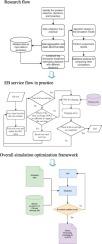A simulation-based optimization approach for the recharging scheduling problem of electric buses
IF 8.3
1区 工程技术
Q1 ECONOMICS
Transportation Research Part E-Logistics and Transportation Review
Pub Date : 2024-10-25
DOI:10.1016/j.tre.2024.103835
引用次数: 0
Abstract
This study proposes a simulation-based optimization approach to address the recharging scheduling problem of electric buses to minimize charging waiting time. Poor scheduling could lead to longer waiting times and potentially affect operation schedules regarding time and service quality. This study addresses a simulation-based optimization framework to evaluate various performance metrics during electric bus service, including waiting times, charging costs, and the utilization of charging piles. In this study, we propose a hybrid approach, simplified swarm optimization (SSO), which is an evolutionary algorithm with a backtracking (BT) mechanism and dynamic charging in a simulation framework. Based on the dynamic charging, SSO is used to determine the additional charging in terms of battery capacities, and a BT mechanism is employed to enhance algorithm efficiency and achieve breakthroughs in solution quality. A case study from Taiwan with 43 generated datasets was conducted in deterministic and stochastic situations to compare the effectiveness and efficiency among three charging rules (i.e., full charging rule, flexible charging rule, dynamic charging rule) and two algorithms (i.e., particle swarm optimization and SSO) The results indicate the superior performance in all scenarios by using a statistical test, which offers effective decision support for bus operators’ electric bus recharging scheduling.

电动公交车充电调度问题的模拟优化方法
本研究提出了一种基于仿真的优化方法来解决电动公交车的充电调度问题,以最大限度地减少充电等待时间。调度不当会导致等待时间延长,并可能影响运营计划的时间和服务质量。本研究采用基于仿真的优化框架来评估电动公交车服务过程中的各种性能指标,包括等待时间、充电成本和充电桩利用率。在这项研究中,我们提出了一种混合方法--简化蜂群优化(SSO),它是一种带有回溯(BT)机制的进化算法,并在仿真框架中实现了动态充电。在动态充电的基础上,利用 SSO 确定电池容量方面的额外充电,并采用 BT 机制提高算法效率,实现解决方案质量的突破。在确定性和随机情况下,利用 43 个生成的数据集对台湾进行了案例研究,比较了三种充电规则(即完全充电规则、灵活充电规则、动态充电规则)和两种算法(即粒子群优化和 SSO)的有效性和效率。
本文章由计算机程序翻译,如有差异,请以英文原文为准。
求助全文
约1分钟内获得全文
求助全文
来源期刊
CiteScore
16.20
自引率
16.00%
发文量
285
审稿时长
62 days
期刊介绍:
Transportation Research Part E: Logistics and Transportation Review is a reputable journal that publishes high-quality articles covering a wide range of topics in the field of logistics and transportation research. The journal welcomes submissions on various subjects, including transport economics, transport infrastructure and investment appraisal, evaluation of public policies related to transportation, empirical and analytical studies of logistics management practices and performance, logistics and operations models, and logistics and supply chain management.
Part E aims to provide informative and well-researched articles that contribute to the understanding and advancement of the field. The content of the journal is complementary to other prestigious journals in transportation research, such as Transportation Research Part A: Policy and Practice, Part B: Methodological, Part C: Emerging Technologies, Part D: Transport and Environment, and Part F: Traffic Psychology and Behaviour. Together, these journals form a comprehensive and cohesive reference for current research in transportation science.

 求助内容:
求助内容: 应助结果提醒方式:
应助结果提醒方式:


